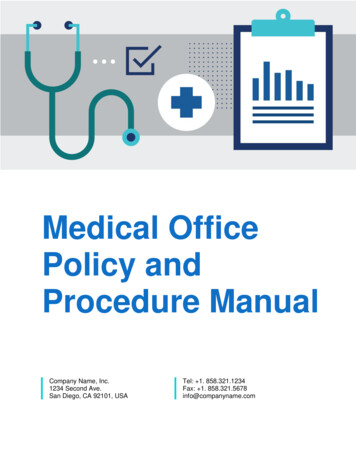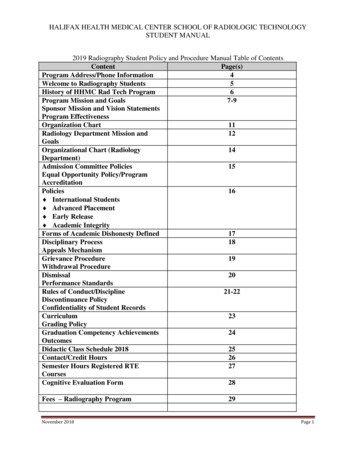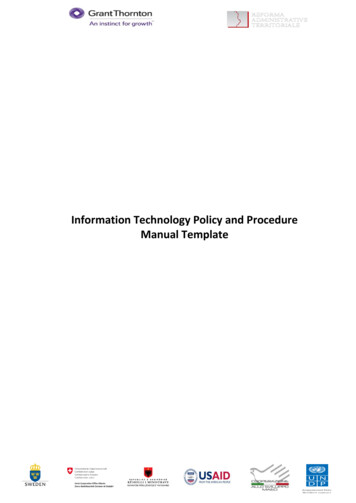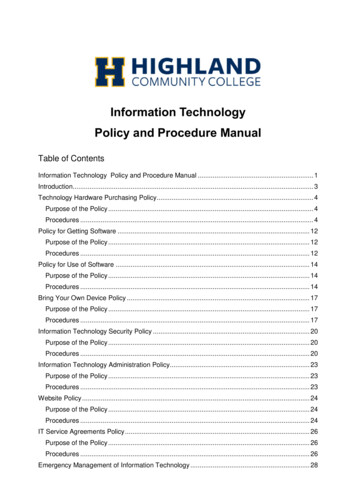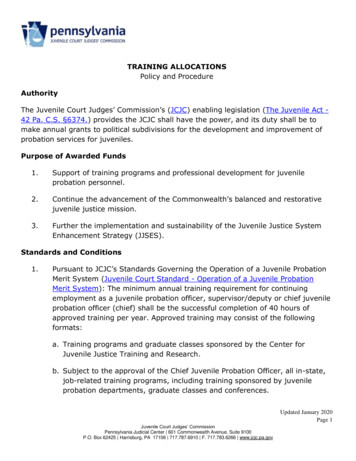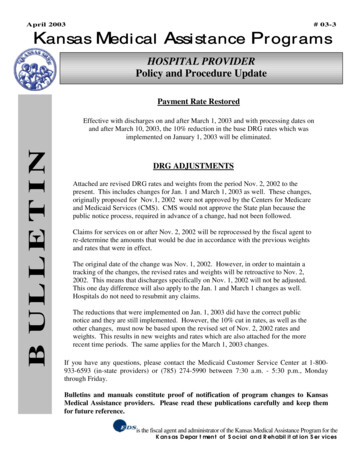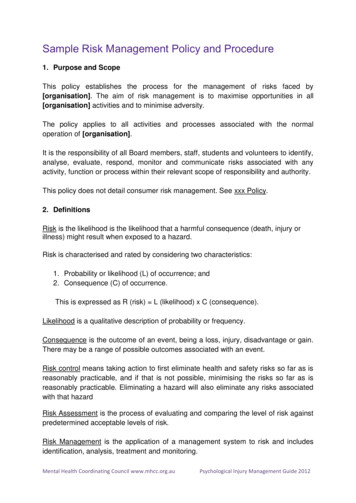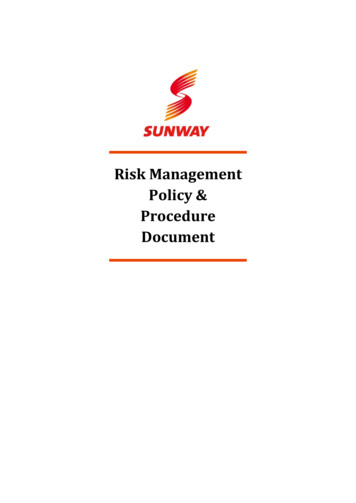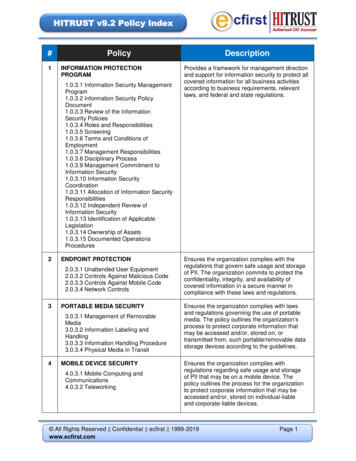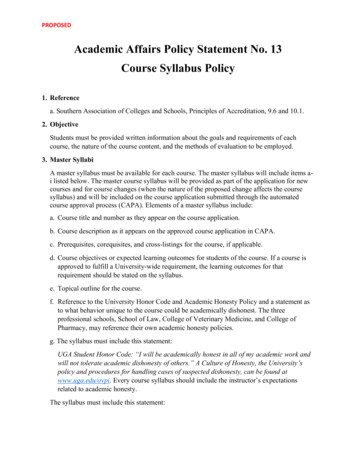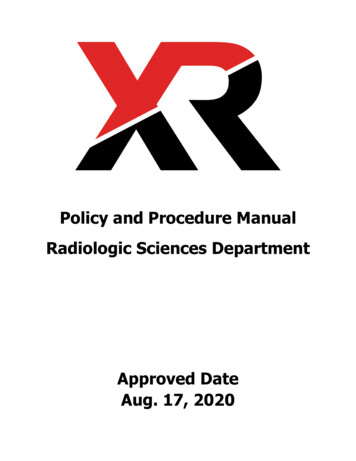
Transcription
Policy and Procedure ManualRadiologic Sciences DepartmentApproved DateAug. 17, 2020
IntroductionThe Radiologic Sciences’ Policy and Procedure Manual is a living document. It isreviewed and revised annually. Each revision is published and distributed to all involvedparties.Policies and procedures are subject to revision based upon changing regulations fromthe state and federal governments, accreditation procedures, and college and clinicalpolicies and procedures. Students and all other involved parties are subject to any newor revised policies that may occur throughout the length of the program, regardless ofthe date they began the program.A receipt acknowledging the distribution of this document shall be considered proof ofhaving received the material, as well as acknowledgement and acceptance of thepolicies within. Furthermore, the recipient understands that any revision supersedes allprevious editions.This manual contains policies, rights, and responsibilities pertinent to the RadiologicSciences department and the Diagnostic Medical Imaging program (DMI). Forinformation regarding college-wide policies, please refer to the current General Catalogof City College of San Francisco (CCSF).The DMI program in the Radiologic Sciences department at City College of SanFrancisco is Radiologic Sciences accredited by the Joint Review Committee on Educationin Radiologic Technology (JRCERT) and is recognized by the American Registry ofRadiologic Technologists (ARRT).The Radiologic Sciences department will provide all persons with equal educationopportunities regardless of race, color, ancestry, national origin, ethnic groupidentification, religion, age, gender or gender identification/expression, marital ordomestic partner status, sexual orientation, disability or AIDS/HIV status, medicalconditions, or status as a veteran, citizenship, genetic information, or any othercategory protected by law with the exception of those students who do not meet thehealth, physical, and mental requirements of the profession.2
Table of ContentsRADIOLOGIC SCIENCES . 5MISSION STATEMENT .5VALUES .5VISION .5GOALS & STUDENT LEARNING OUTCOMES .6CODE OF CONDUCT . 7CCSF’S STUDENT CODE OF CONDUCT .7FACULTY RESPONSIBILITIES .7STUDENT HEALTH AND TECHNICAL STANDARDS . 8AMERICANS WITH DISABILITIES ACT .8BACKGROUND CHECK .8DRUG SCREENING .9CARDIO-PULMONARY RESUSCITATION (CPR) CERTIFICATION.9HEALTH REQUIREMENTS .9ANNUAL VACCINES . 10CURRICULUM SEQUENCE . 11PROGRAM LENGTH AND ADVANCED STANDING/TRANSFER . 12STUDENT LEARNING OUTCOMES . 12CLINICAL EDUCATION. 13VENIPUNCTURE CERTIFICATION . 13PROGRAM STANDARDS . 14CELL PHONES AND PERSONAL ELECTRONIC DEVICES . 14CONTROLLED SUBSTANCES . 14DRESS CODE . 14ORIENTATION . 15RADIOLOGIC MARKERS . 15SOCIAL MEDIA . 16ACADEMIC STANDARDS . 17GRADING SCALE . 17CLINICAL STANDARDS . 18SCOPE OF PRACTICE FOR THE RADIOLOGIC TECHNOLOGY STUDENT . 18ASSIGNMENTS (PLACEMENTS) . 18CLINICAL TRANSFER REQUEST . 19HIPAA. 20INSURANCE . 20INCIDENT - PATIENT . 20INCIDENT - EQUIPMENT . 20RECORD MAINTENANCE . 21RADIATION SAFETY PRACTICES. 22SCHEDULING. 22SUPERVISION . 233
PROFESSIONAL CONDUCT AND DISCIPLINARY PROCEDURES . 24COACHING, WARNING, AND REPRIMAND . 25ACADEMIC PROBATION . 25DISMISSAL . 25APPEALS . 26FACULTY COMPLAINT . 26JRCERT STANDARDS. 26READMISSION . 27ATTENDANCE . 28ATTENDANCE - DIDACTIC . 28ATTENDANCE - CLINICAL . 28BEREAVEMENT LEAVE . 28CONFERENCE DAYS. 29FLEX DAYS . 29HOLIDAYS . 29HOSPITAL STRIKES . 29INTERNSHIP PTO. 30JURY DUTY. 30LEAVE OF ABSENCE. 30VOLUNTARY WITHDRAWAL . 31STUDENT INJURIES . 32ON CAMPUS STUDENT INJURY . 32CLINICAL SITE STUDENT INJURY . 32DESIGNATED TREATMENT FACILITIES . 33PREGNANCY . 34REQUEST FOR VOLUNTARY WITHDRAWAL . 34REQUEST FOR LEAVE OF ABSENCE DUE TO PREGNANCY . 34REQUEST FOR NO MODIFICATION OR INTERRUPTION . 35REQUEST FOR PARTIAL MODIFICATION OR INTERRUPTION . 35STANDARD (UNIVERSAL) PRECAUTIONS . 36PHYSICAL FACILITIES AND RADIATION PROTECTION . 38RADIOLOGIC EQUIPMENT . 38RADIATION PROTECTION PROCEDURES . 39RADIATION MONITORING DEVICE. 394
Radiologic SciencesMission StatementThe Radiologic Sciences department at CCSF is dedicated to the advancement of theallied health care industry by providing educational opportunities that foster ethical andcompassionate behavior, professional development, and a respect for human diversity.Our values accomplish this mission through the department’s acronym: CCSF RADSCIValuesCompassionate patient careContinued pursuit of learningSensitivity to the learning needs of our studentsFair and equitable treatment for allRespect for allAccountability and ethical behaviorDiversity consciousnessService to the community and the advancement of the professionCommitment to excellence in the Radiologic Technology ProfessionIntegrity of the educational processVisionTo provide superior educational opportunities that ensure CCSF Radiologic Sciencesgraduates are among the highest qualified radiologic technologists in the industry.5
Goals & Student Learning OutcomesUpon graduation from City College of San Francisco’s Diagnostic Medical Imaging Program,students will be able perform the following goals and outcomes:Goal 1: Students will demonstrate CLINICAL COMPETENCE1.1: Students will apply positioning skills1.2: Students will practice radiation protectionGoal 2: Students will demonstrate CRITICAL THINKING2.1: Students will analyze radiographic images2.2: Students will manipulate technical factorsGoal 3: Students will demonstrate an understanding of PROFESSIONALISM3.1: Students will demonstrate professional ethics3.2: Students will demonstrate an appreciation for radiologic sciencesGoal 4: Students will demonstrate effective COMMUNICATION skills in themedical environment4.1: Students will demonstrate oral communication skills4.2: Students will practice written communication skills6
Code of ConductCCSF’s Student Code of ConductThe official CCSF Student Code of Conduct can be found on the ccsf.edu website.Enrollment within the Radiologic Sciences department is considered implicit acceptanceof the CCSF Student Code of Conduct. CCSF’s processes are designed to educate and,where appropriate, sanction those students who violate college regulations. We seekboth to promote a student’s sense of responsibility by enforcing accountability, and toprotect our community, when necessary, which may mean removing or restricting thosewho pose a threat to others.Faculty ResponsibilitiesCurrency in Didactic InstructionWhen our instructors speak from experience, it is current. Our instructors have decadesof experience in the field of radiology. Many faculty members serve on variousstatewide and national committees that determine the future of radiologic technologypractice, and these faculty members hold multiple degrees and credentials.Superior Laboratory FacilitiesThe CCSF Radiologic Sciences department strives to maintain current equipment thatreflects what is used in the clinical setting. This ensures that students develop strongskills that accompany them into the medical environment.Strong Clinical AffiliatesThe Radiologic Sciences department affiliates with hospitals that are among the mosthighly rated hospitals in the country. All clinical affiliates provide an emphasis onexcellent customer service. Our affiliates are set in a dynamic urban environment, whichprovides experience with a diverse patient and professional population.This combination of excellence in didactic and clinical instruction opportunities ensuresthe CCSF Radiologic Sciences department will fulfill its vision, now and in the future.7
Student Health and Technical StandardsAmericans with Disabilities ActIn accordance with Section 504 of the Federal Rehabilitation Act of 1973 and theAmericans with Disabilities Act of 1990, CCSF makes reasonable adjustments in itspolicies, practices, services, and facilities to ensure equal opportunity for qualifiedpersons with disabilities to participate in all educational programs and activities.Disabled Students Programs and Services (DSPS) provides information and assistance,arranges accommodations, and serves as a liaison for students, instructors, and staff.To assist students the office has books on tape, recorders, and adaptive software thatcan be lent to qualified individuals. A student/employee who seeks accommodations onthe basis of disability must register with DSPS, Rosenburg Library, room 323.Documentation of disability from a competent professional is required.Individuals with grievances related to discrimination or lack of accommodation on thebasis of a disability are encouraged to resolve the problem directly with the areainvolved. If the matter remains unresolved, advice and assistance will be provided byDSPS. Specific information on filing a grievance is available through DSPS.The Director of DSPS serves as the ADA Coordinator and may be contacted at (415)452-5481.Background CheckA background check is required. The student will incur the cost for this procedure.Students must complete this background check upon admission to the program andprior to any clinical placement. A positive background check finding will require the student to follow the ARRTpre-application procedure during the first semester in the program and prior toany clinical placement. This procedure is located at www.ARRT.org and thestudent will incur all costs. Failure to complete and pass the ARRT pre-application procedure and ethicsreview before clinical placement will be cause for program dismissal Clinical rejection due to any positive background check finding regardless of theARRT ethics review process will be cause for program dismissal Any change in felony or misdemeanor status while in a Radiologic Sciencesdepartment program will result in the student following the step above and maybe cause for program dismissal8
Drug ScreeningDrug screening is required. The student will incur the cost of this procedure. Studentsmust pass a drug screen upon admission to the program and prior to clinical placement. Positive drug screens (including marijuana) can be cause for program dismissal Students may be required to submit to subsequent randomly conducted drugscreening tests while in a Radiologic Sciences department program Any change in drug screening status while in a Radiologic Sciences departmentprogram may also be cause for program dismissalCardio-Pulmonary Resuscitation (CPR) CertificationAll students must maintain a current CPR certification (card) in BLS – Adults andChildren, prior to entering and throughout their clinical assignment. Failure to have acurrent card will preclude the student from beginning or remaining in the clinicalassignment until renewed. All time missed due to non-compliance will come fromPTO/Conference time or must be made up.Health RequirementsOnce enrolled in a Radiologic Sciences department program, students are required tohave certain vaccinations and positive titer results per the San Francisco HealthDepartment. In addition, the student must satisfactorily complete a physicalexamination given by an appropriately licensed health care provider and proven to bephysically able to perform the functions of this profession. Also, the student mustsuccessfully pass a drug screen. The student will incur all costs of these activities.Clinical placement is dependent upon completing and passing all health requirements.Failure to comply with any health requirements may be cause for program dismissal. Allhealth requirements must be met before clinical placement.Vaccination ProofVaccination proof is a document from a healthcare provider documenting you havereceived a vaccine. The student must furnish proof of vaccination for: Td
of City College of San Francisco (CCSF). The DMI program in the Radiologic Sciences department at City College of San Francisco is Radiologic Sciences accredited by the Joint Review Committee on Education in Radiologic Technology (JRCERT) and is recognized by the American Registry of Radiologic Technologists (ARRT).
